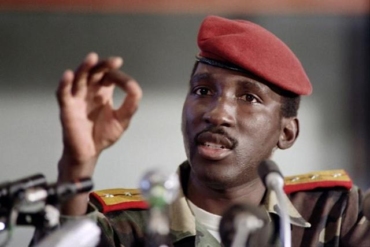Thirty-four years since the shocking killing of Burkina Faso’s then President, Thomas Sankara, 14 men are going on trial, accused of complicity in the murder of one of Africa’s heroes, Thomas Sankara.
The charismatic Pan-Africanist was shot dead aged 37 by soldiers during a coup on 15 October 1987, which saw his close friend, Blaise Compaoré, come to power. Four years previously, the pair had staged the takeover which saw Sankara become president. The trial was a long time coming because Blaise Campaore who is believed to have helped plan his murder was in power for almost 30 years.
His widow filed a criminal complaint in 1997 over the murder of her husband, but it took 15 years for the Supreme Court to rule that the investigation could continue. However, little progress was made until Mr Compaoré was overthrown in 2014. Also in 2016, the Burkina Faso authorities officially asked the French government to release military documents about Sankara’s assassination. Those archives were declassified and transmitted to Burkina Faso in three stages – the final one in April 2021.
Mr Compaoré is among the 14 accused but he is currently in exile in neighboring Ivory Coast, where he fled after being forced to resign during mass protests in 2014. He has repeatedly denied involvement in Sankara’s death and is boycotting the trial.
SANKARA WAS A HERO BECAUSE….
- It was under his rule that the country was renamed – from Upper Volta to Burkina Faso, meaning “Land of Upright People”.
- Sankara himself led an austere lifestyle. He reduced his own salary, and that of all public servants. He also banned the use of government chauffeurs and first-class airline tickets.
- Education was a key priority – while he was in power, the literacy rate increased from 13% in 1983 to 73% in 1987, and he also oversaw a massive national vaccination campaign.
- He also redistributed land from local chiefs and gave it directly to poor farmers, which led to a huge increase in cotton production.
- Sankara called for a united Africa to stand against what he called the “neo-colonialism” of institutions such as the International Monetary Fund (IMF) and the World Bank.
- He adopted an anti-imperialist foreign policy which challenged the dominance of France, which retained huge influence in many of its former colonies in Africa, such as Burkina Faso. His widow Mariam has accused France of masterminding his assassination.




